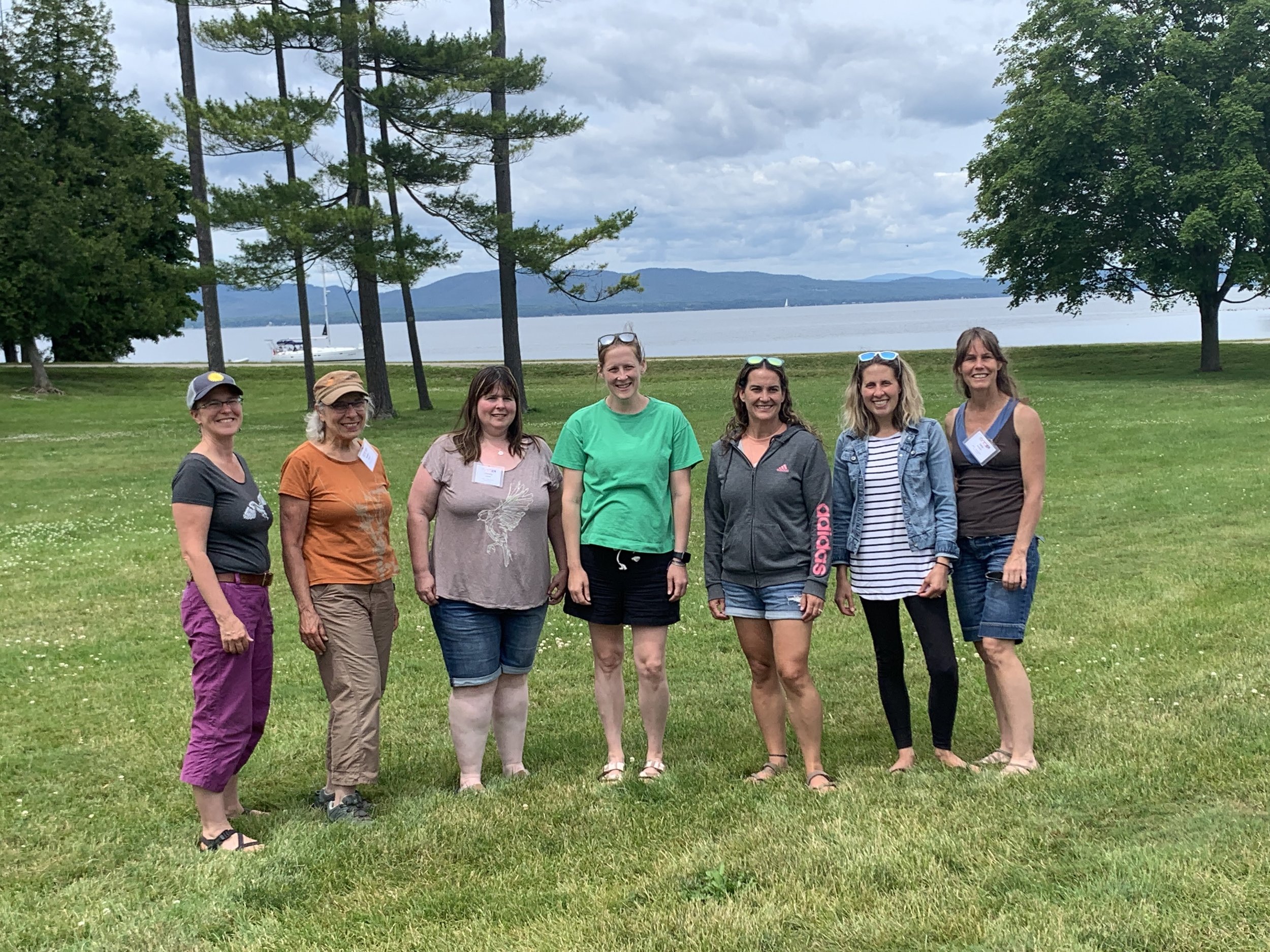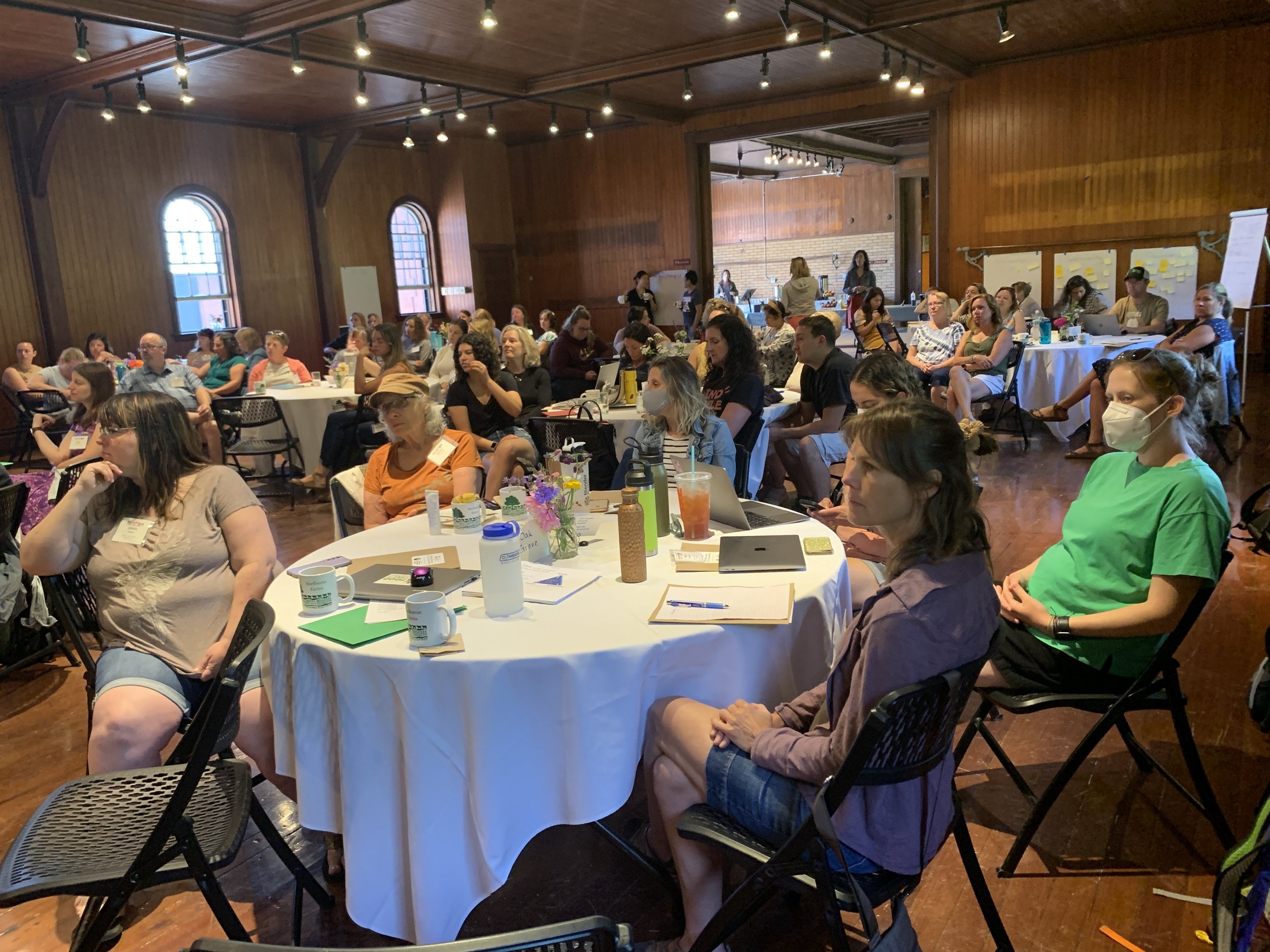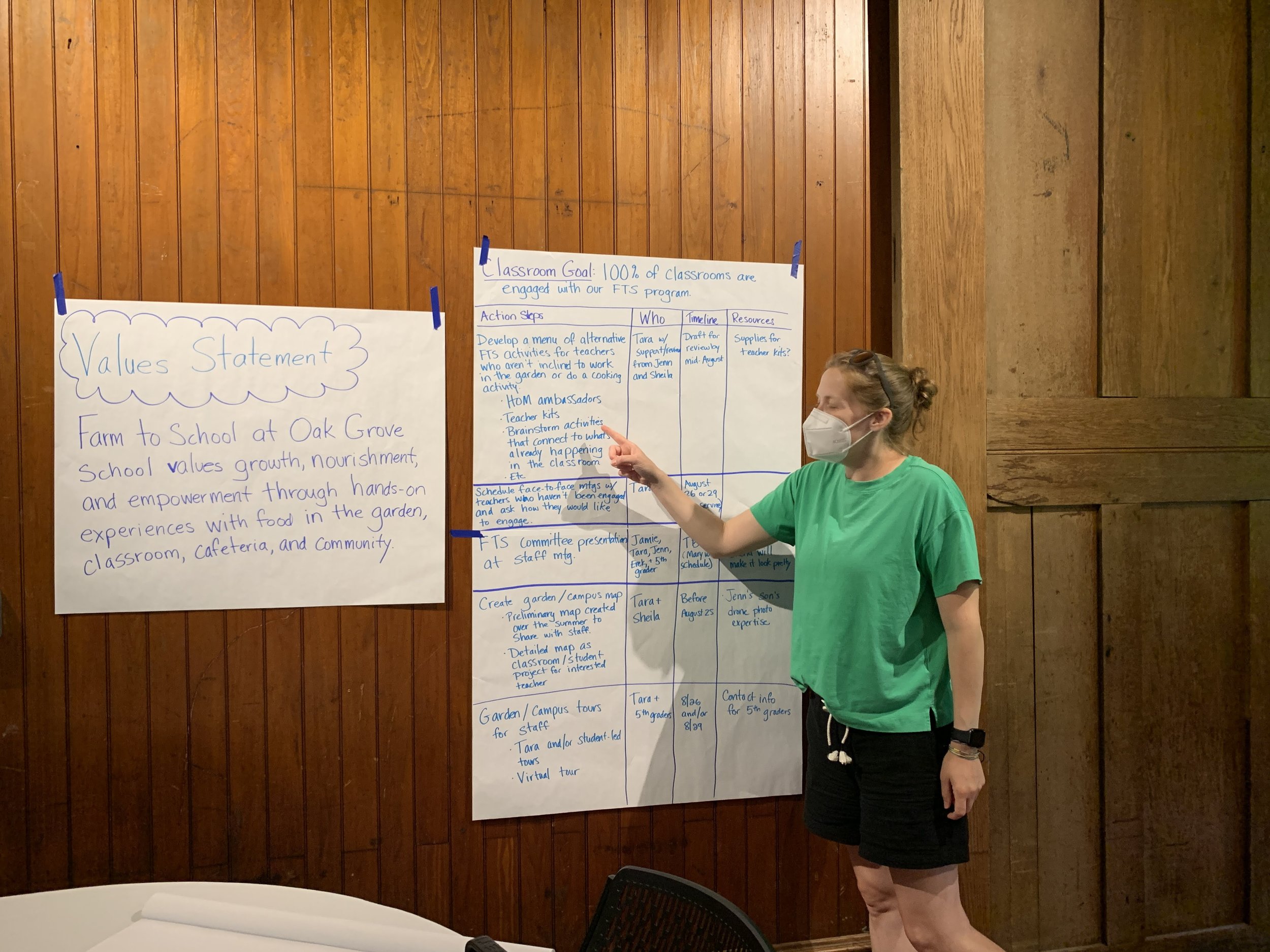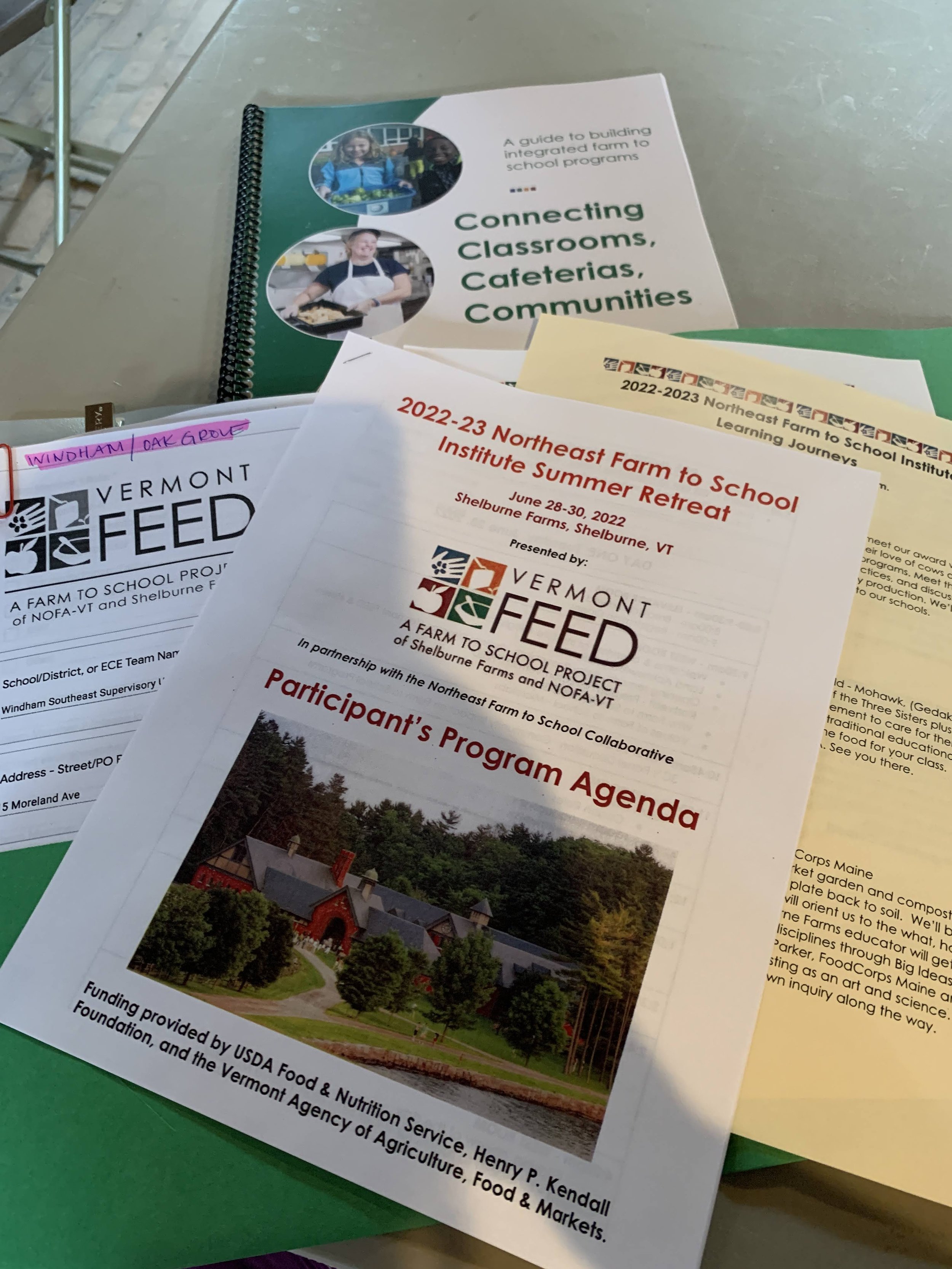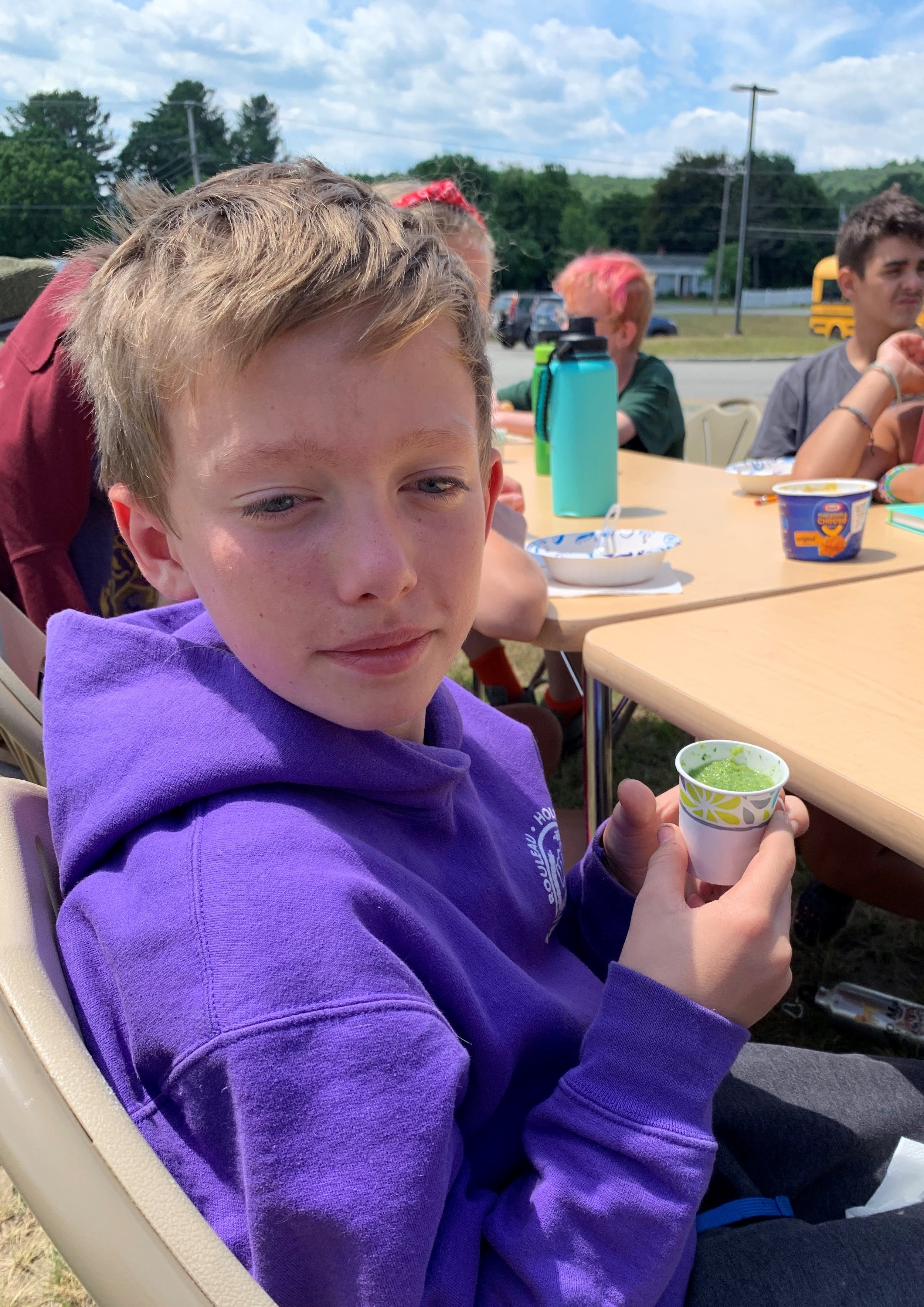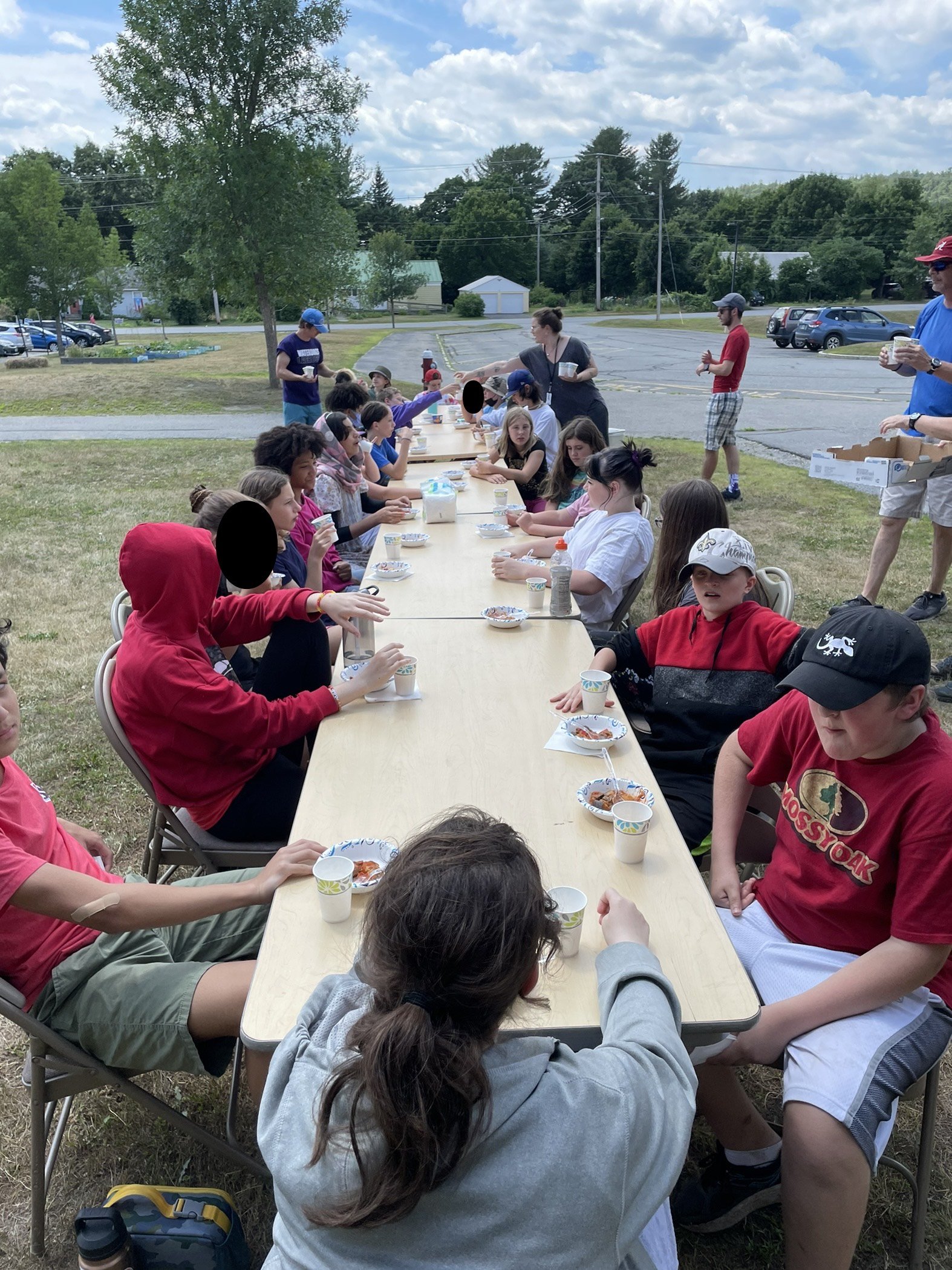In March 2022, Townshend Elementary School launched its Farm to School program, offering monthly taste tests and activities for students, focusing on the Vermont Harvest of the Month. Part-time teacher Kelsey Taddei volunteered her time to run the program with Food Connects FTS coach Jenny Kessler. By the end of the school year, it was clear that students and teachers alike really enjoyed growing their knowledge about local food. But the program needed resources to pay a Farm to School Coordinator to run programming, purchase supplies and curricular materials, and build a small garden.
September 2022 Farm to School Connection
Get to Know Our Member Schools
Food Connects Celebrates the 2021-2022 Farm to School Year
Appreciation for New Chapter, Our Long-Time Farm to School Sponsor!
Highlighting Successes in Food Connects’ Member Schools during the 2021-2022 School Year
The week before the start of the 2022-23 school year, Food Connects hosted a Celebration of Farm to School for school administrative teams and food service directors. We are so proud of the work being done by Farm to School teams at our member schools in Windham Central Supervisory Union, Windham Northeast Supervisory Union, and Windham Southeast School District, and we are grateful to the leaders who help make the work possible. At the event, we shared highlights from the 2021-22 school year at each member school, and we want to take a moment to share those highlights with a wider audience. Read on to hear the wonderful things happening in schools throughout the region!
Food Connects’ Farm to School Celebrates Long-Time Sponsor, New Chapter®
Food Connects Celebrates the 2021-2022 Farm to School Year
August 2022 Farm to School Connection
Farm to Table Camp
An Inspiring Year at Central Elementary School
Oak Grove at NEFTSI
Library of Things
VGN Mobile Garden Classroom
VSECU: Improving the Lives of VT Kids
August 2022 Round Up at the Monadnock Food Co-op
Reinvigorating Farm to School at Oak Grove School
Gathering on the shores of Lake Champlain for three glorious days at the end of June, dedicated members of Oak Grove School’s Farm to School (FTS) Team immersed themselves in learning and planning their next steps towards strengthening their FTS program. The Oak Grove team is participating in the Northeast Farm to School Insititute (NEFTSI) this year. The June retreat began a year-long professional learning opportunity to strengthen FTS programming at the school. Now in its 12th year, NEFTSI is a tremendous resource for schools looking to increase the capacity of farm, food, and nutrition education to impact lasting change in classrooms, cafeterias, and the community.
FTS teams comprised of educators, food service professionals, administrators, and community members from 10 different schools and school districts in Vermont, Connecticut, Massachusetts, Maine, Rhode Island, New York, and Nebraska were in attendance at NEFTSI this year. With such a diverse group of participants, there were many opportunities to cross-pollinate ideas among rural and urban schools serving pre-K through 12th-grade students.
The NEFTSI agenda featured a mix of inspiring speakers, hands-on learning opportunities, and focused work time with the support of a coach to set achievable goals for the upcoming year. Participants were nourished by delicious meals made from recipes in the New School Cuisine Cookbook and featuring local, seasonal produce throughout the institute. Workshop topics ranged from “Bringing the Food System Alive in the Garden and Compost” to “Farm to School in the Classroom Through an Equity Lens,” giving participants multiple opportunities to engage in hands-on learning with topics of their choosing.
Oak Grove School has had an FTS program for over 15 years. Their garden program has taken a big step forward in recent years by adding a part-time garden coordinator, Tara Gordon. Recent changes to the garden include moving the primary garden beds to a more central location and adding several pollinator gardens and other plantings to their Living Schoolyard.
At NEFTSI, the team began by crafting a values statement to guide their work and explicitly communicate their values to the greater community. After reviewing some sample values statements by other FTS teams and doing some group brainstorming, the team quickly agreed on the following statement:
“ Farm to School at Oak Grove School values growth, nourishment, and empowerment through hands-on experiences with food in the garden, classroom, cafeteria, and community.”
Next, the team moved on to goal-setting. Oak Grove’s FTS program had a few setbacks during the COVID-19 pandemic, one of which was that the school-wide harvest dinner was canceled for two years, and it is unknown whether it will return in 2022. This annual harvest celebration allowed the entire school community to engage in gardening and cooking together. The loss of that school-wide activity has impacted full school participation in the FTS program. On the other hand, the pandemic has motivated some classrooms to spend even more time outdoors in the school garden than they did before the pandemic. Currently, about ½ of the faculty at Oak Grove actively engage with their students in FTS activities regularly throughout the school year. One of the goals set by the team at the Institute is to increase classroom participation in FTS back up to 100%.
With no guarantee that the harvest dinner would come back this year, the team had to think creatively about other ways to encourage classroom participation in FTS activities. The team plans to kick off this goal by hosting a garden party for school staff before the start of the school year to encourage staff who don’t usually visit the garden to step outside and eat a delicious lunch together. A simple garden map will be created before the garden party to help teachers know what is growing in the garden and where to find it. Tara hopes to partner with a classroom to engage students in making a more detailed garden map as a special project this year.
Plans are also in the works to develop a menu of creative and easy-to-use FTS lessons and activities for teachers who are not inclined to garden or cook with students and to help teachers connect these lessons to things already happening in their curriculum. Tara is available to work with all classrooms, and Principal Mary Kauffman will use the existing system of grade level accountability partners to encourage teachers to check in with a peer once a month about this school-wide goal of engaging with the school’s FTS program at least once during the school year.
That’s just one of the five goals set by the team to work on this year. Here’s a snapshot of the other four goals:
Increase student participation and reduce food waste in the fresh fruit and vegetable snack program
Bring back monthly Harvest of the Month taste tests
Increase family engagement in FTS throughout the whole year (including summer)
Increase communication about FTS to families & staff
Freshly inspired, this team is ready to continue transforming their school culture to offer more and more opportunities for hands-on learning with farm, food, and nutrition education, and we can’t wait to see the fruits of their hard work emerge throughout the year!
Arrange a Mobile Garden Classroom Visit!
Vermont Garden Network’s new SNAP-funded mobile garden classroom is ready to hit the road! They are arranging site visits and workshops around the state for the remainder of the 2022 gardening season. Click here to learn more and view their calendar.
Some example workshops include:
Cooking with Seasonal Vegetables
Nutritional Benefits of Fresh Produce
Food Preservation
Canning
Dehydration
Pickling
Soil Health
Home / School Composting
Soil Amendments
Low Impact Pest Control
Garden Construction
Building ADA-accessible garden beds
Building Compost Bins
Most workshops are around 1-1.5 hours in length. Leading up to each workshop, they will collect details about your possible participants’ previous experiences with these topics, what areas of focus would be most beneficial for your group, and any accessibility needs from participants. This will allow them to tailor the experience to your group and make it as inclusive and informative as possible.
Contact Cedar Schiewetz at cedar@vtgardens.org to further discuss a workshop for your school or community group!
A Library of Garden and Food Preservation Tools
Earlier this summer, Brooks Memorial Library celebrated the grand opening of its Field to Fork Tool Cottage in the adjacent municipal parking lot. The cottage contains a library of garden and food preservation and preparation tools. Any item is available for loan to holders of library cards, which are free to Brattleboro residents, property owners, and business owners.
“Libraries are built on a model of mutual support and the sharing economy,” writes Library Director Starr LaTronica. “This new collection of objects is a natural fit with the Library’s mission to connect people and resources to inspire, inform and empower our diverse community.”
Here is a small sampling of the many useful things you can borrow for up to 8 days at a time from the Field to Fork Tool Cottage:
Air fryer
Food dehydrator
Pole saw
Post hole digger
Wheelbarrow
Weedwhacker
Pasta machine
What an excellent new resource for our community!
Farm to Table Camp Tickles Taste Buds of Teens
Rising 7th and 8th graders had a unique and delicious opportunity to hone their culinary skills over the summer thanks to the leadership of Brattleboro Area Middle School (BAMS) teacher Marissa Fuoroli. During the first week of July, 31 students participated in a Farm to Table-themed camp, offered for free to all BAMS students. They began the week with more straightforward projects like fruit smoothies, homemade pizza, and cinnamon rolls. For the final day of the camp, they worked together to make a 3-course meal featuring a chilled creamy cucumber soup, a main course of ratatouille, and a chocolate chia seed pudding with raspberry sauce for dessert. Guest teachers from Edible Brattleboro and Food Connects supported this culminating feast. These extra hands made making multiple dishes at once much easier for Brattleboro Enrichment Activities for Middle School (BEAMS) program staff.
As preparation for the cooking, students discussed the various ingredients in the recipes and decided which ingredients could be locally grown.
“Has anyone ever grown cucumbers in their garden or seen them growing in the school garden?”
“YES!”
“What about lemons?”
Some students were unsure and thought that perhaps lemons could be grown in Vermont, while others were reasonably confident that lemons needed a warmer climate to thrive. This discussion invited a deeper conversation about the different conditions plants need to grow.
When it came time for cooking, students worked in pairs to peel, chop, and measure the ingredients and follow the recipe. The result was a feast for the whole group, served on the lawn in front of the school.
““At the end of the smoothie-making day, (my son) proudly told me that his smoothie came out very tasty, and he is making smoothies at home for himself now.””
Students left the camp feeling more confident in the kitchen. In fact, Jenny Conathan, mother of rising 7th-grader Liam Conathan-Leach, said, ”In the past, Liam was reluctant to make his own smoothies and always asked me to make them. At the end of the smoothie-making day, he proudly told me that his smoothie came out very tasty, and he is making smoothies at home for himself now.” When asked for his secret smoothie recipe, Liam replied, “I like to keep it very simple, with bananas, strawberries, and orange juice.” Yum!




